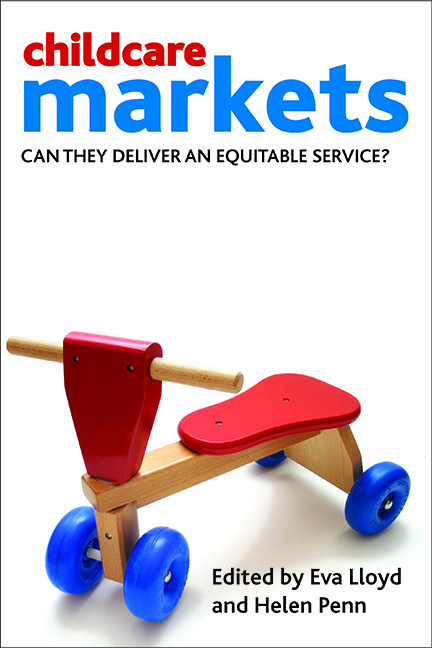two - Childcare markets: do they work?
Published online by Cambridge University Press: 01 September 2022
Summary
Introduction
This chapter considers the limitations of using the market as a workable model for the organisation and delivery of childcare. It presents a brief overview of the reach of economics as a basis for making decisions about childcare, and describes changes in ideas about the application of market principles to traditional welfare contexts.
It describes the neoliberal view of the market, in which the role of the state is regarded as minimal, and taxation and regulation are viewed as mainly controversial impositions on business. From this perspective individual choice – including the choice of parents seeking to buy childcare – is paramount; and the best placed people to provide childcare are entrepreneurs whose profits depend on their accurate reading of market demand. Entrepreneurs are therefore likely to be more cost effective and flexible in meeting demand than any than any monolithic state provider could be, and are more likely to be able to muster the capital investment to set up the childcare service. The childcare market is a way of describing a situation where the state has relatively little influence on – or interest in – how services for young children are set up, maintained and delivered.
This is contrasted with a social welfare view of the role of the state, in which communal obligations and social citizenship are given greater priority. Prioritising profit over the needs of vulnerable individuals, such as young children or old and frail people is viewed as morally repugnant, and undermining of basic communal solidarity, citizenship and caring. In this view, the state is the best guarantor that childcare services will be reliable and, in particular, will meet the needs of the most vulnerable alongside those of the strongest, each benefiting from each other's participation in the service (Sandel, 2009). Here the key issue is equity rather than choice.
The market model for childcare, as opposed to a state provided and/or a state funded model of childcare, has been adopted with little public discussion in a number of mainly neoliberal English speaking countries and also in many East and South Asian countries (see Yuen, this volume). In Canada there has been a debate about the role of for-profit childcare versus non-profit care, but essentially within a market context.
- Type
- Chapter
- Information
- Childcare MarketsCan They Deliver an Equitable Service?, pp. 19 - 42Publisher: Bristol University PressPrint publication year: 2012

